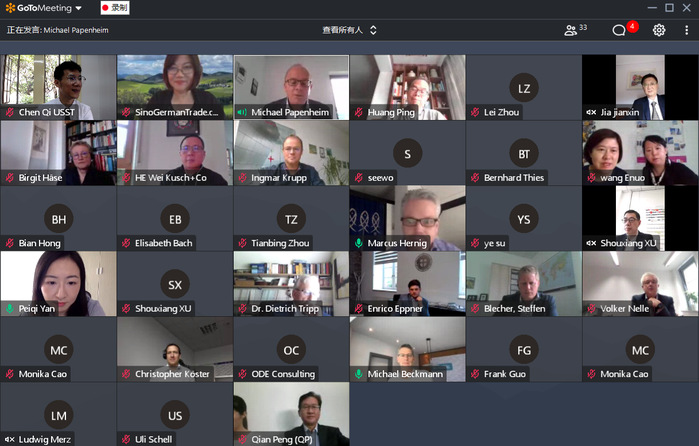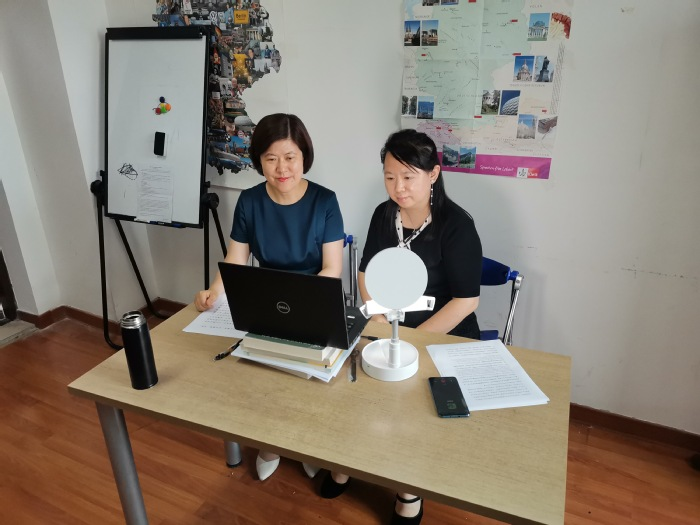On June 24th, 2021, China and Sauerland, Germany held a Chinese-German bilingual dialogue forum online entitled “China and Sauerland, Germany in 2021: Grasp the Opportunity to Know China.” Launched and organized with the help of German Trade and Investment Agency (GTAI) and the majors of the three cities of Winterberg, Hallenberg and Medebach in Sauerland, Germany, the Sino-German Trade Network (SGT) and University of Shanghai for Science and Technology (USST) cooperated to hold the forum, co-chaired by Marcus Hernig and Wang E’nuo, associate professors of the College of Foreign Languages of USST. Apart from the three above-mentioned majors, German participants also included Professor Uli Schell, president of Kaiserslautern University of Applied Sciences, Dr. Birgit Häse, director of the Centre for East Asian Studies, University of Dresden, and Isabel Wiedenroth (whose Chinese name is Zhou Yunjie), founder of SGT. Participants on China’s side include Mr Jia Jianxin, the previous cultural counsellor of Chinese Culture and Tourism Department, Professor Huang Ping(Doctor), the researcher of Europe of Chinese Academy of Social Science, Prof. Liu Qin (a doctoral degree holder), dean of the College of Foreign Languages of USST, Prof. Chen Qi (doctor), deputy director of the International Affairs Office Centre of USST, Mr Xu Shouxiang, director of the Foreign Affairs Office of FAW-Volkswagen, and Mr Qian Peng, general manager of ODE Consulting Company (China).
At the opening ceremony, Liu Qin, dean of the College of Foreign Languages of USST and deputy director of Shanghai Institute of Public Diplomacy, first extended her sincere greetings to all the participants, and went on to say that public diplomacy, whose significance is becoming more and more important, will be playing an increasingly important role in the process of China’s fast integration into the world and active participation in international economic cooperation and in the development of China in the future. The core category of public diplomacy is the statement of “promoting international the construction of international communication capacity, telling China’s stories well, presenting a true, three-dimensional and full-scale China, and improving China’s cultural soft power.”
The development requirements of Shanghai’s public diplomacy agrees well with the educational philosophy and culture of USST, a famous university with a history of over a hundred and ten years in Shanghai. Against such a background, Shanghai Institute of Public Diplomacy has come into being. As a co-constructor of the institute, USST will rely on the resources of Shanghai Public Diplomacy Association to bring into full play the advantage of academic management in institutions of higher education, and make adequate use of all kinds of academic resources and personnel resources in the university to promote the development of the construction of the institute. Meanwhile, Professor Chen Qi, deputy director of the International Affairs Office of USST, also extended warm greetings to all the participants. Chen Qi introduced the situation of foreign exchange at USST: currently there are nearly 1,000 international students at the university; USST has so far established cooperation relationships with more than 170 colleges and universities in over 30 countries and regions, such as USA, England, Germany, Canada, Japan, Australia, and Ireland. Of the 1,000 odd international students studying in USST, students from Germany, mainly exchange students, make up the largest percentage. Chen Qi also introduced the close cooperation between USST and Germany’s universities, and Germany research institutes.
At the forum, over 20 experts and scholars from political circles, academic circles and economical circles from China and Germany exchanged in-depth views for up to 4.5 hours, conducting fruitful discussions from the three aspects of political mutual trust, economic exchange and cultural understanding. The meeting is in a warm atmosphere. What impresses people most is that Ms. Isabel Wiedenroth, founder of German SGT, proposed to the relevant German companies attending the meeting that in the time of digital transformation, German companies should pay more attention to China’s market, make changes according to the times and place, seize the opportunity, seek common ground while reserving differences, create a win-win situation with China and face the world’s common challenges together. Chinese leaders and experts exchanged their ideas about the connotations of public diplomacy: the key to sound relations between countries lies in the friendly relations between their peoples. Chinese and German experts and scholars also had a lively discussion about Mr Fei Xiaotong’s 16-character maxim, “Each values its own time-honored culture; and should learn to appreciate the time-honored cultures of others for the good of all nations in the world”, while dealing with Sino-foreign cultural relations.
The restart of the cooperation of the world needs the full cooperation between China and Germany, as they are two responsible major countries in the world. Through the holding of this video meeting, active effects of promoting the good development of Sino-German relationship in many dimensions of politics, economics and culture, and expanding the circles of friends between China and Germany are achieved.
The video meeting is also a gift to the newly founded Shanghai Public Diplomacy Institute to promote the relationship between China and Germany. The preliminary work of this meeting was well prepared in advance: over 15,600 copies of the local newspaper were published in Germany on June 18th. The fruitful results of the meeting on June 24th will also be published in both Chinese and German media. Through these actions, USST and Shanghai Public Diplomacy Institute hope to deliver to the peoples of the two countries a voice that the Chinese and German peoples are friendly to each other and trust each other, and that we will better promote the relationship between the two countries through communication to “appreciate the time-honored cultures of others for the common good of all nations.”




